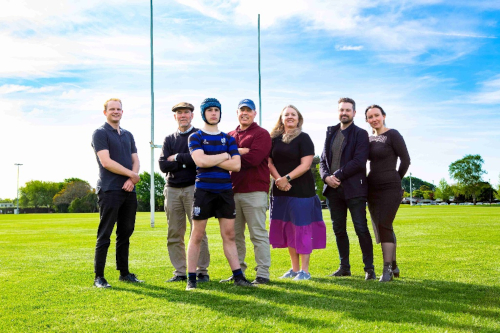
A University of Canterbury team has developed new protective headgear for junior rugby players that could be on sale early 2026.
Professor Nick Draper, from Te Whare Wānanga o Waitaha | University of Canterbury (UC) Faculty of Health, says the softshell headgear prototype is the culmination of over a decade of his research team’s work investigating the causes and consequences of head collisions experienced by rugby players.
“All of the studies we’ve done over the years on collisions, and the data we’ve collected from field trials on players, particularly in the junior grades, has helped us understand what kind of headgear will make a real difference,” he says.
This data has been integrated with cutting-edge UC engineering innovations, including advanced impact testing, machine learning-based analysis of head impacts and protective material design.
Professor Draper, who has won a UC Innovation Medal recognising his pioneering work and its community impact, says he is proud of the world-class research and design behind the prototype but also aware of costs for families. “We want to protect young players from head injury-related harm, so we’re aiming to keep the price of this new product to a minimum.
“Combined with a quality mouthguard and good contact technique, this headgear provides the best protection available for young rugby players,” he says.
Junior players, aged between eight and 18, make up about 80% of those actively involved in the sport in New Zealand.
As a rugby coach and father of three rugby-playing sons, Professor Draper is passionate about promoting safety in the sport. “I think as researchers and as a university, we have a responsibility to find ways to make the game safer for our children.
“Rugby is our national game, it’s a contact sport and the majority of our active rugby players are juniors, so the effect of concussion on kids is a significant health issue.”
The new UC headgear is branded Ruru, named after New Zealand’s native owl or morepork. Local Māori graphic designer and visual artist Morgan Darlison (Ngāi Tahu, Ngāti Porou, Tainui) has been involved in the prototype’s design and UC PhD Mechanical Engineering graduate Dr Simon Blue contributed to its development and testing, building on work by UC Mechanical Engineering PhD students Congyu Xu and Annette Swale.
“Rugby is an important sport for Māori communities, however evidence shows they are more at risk in terms of the recovery from head injuries. So, we wanted the design to be appealing to all young players, but particularly young Māori players,” Professor Draper says.
The UC Collisions in Junior Rugby research team is a collaborative, multi-disciplinary project that includes Mechanical Engineering Senior Lecturer Dr Natalia Kabaliuk, Dr George Stilwell, and Emeritus Professor Keith Alexander, along with Associate Professor Jeremy Hapeta, UC Māori Director Blair Johnstone and School of Health Sciences Lecturer Stacey Niao.
Dr Kabaliuk, lead engineer on the project, says a United States-based company is already interested in licensing the new headgear. “It’s very exciting, so once it’s approved for use by World Rugby, we will look to launch it on the market.”
The safety and performance of the new headgear, developed with support from Medtech-iQ Aotearoa, has been tested using the team’s custom-built drop-test rig in preparation for formal testing by World Rugby next year.
The UC research project has been carried out in collaboration with the Canterbury Rugby Football Union and Ellesmere Rugby Sub Union, with over 300 players from Year 8 (U12/13) to First XV teams involved over the past decade. The studies have involved MRI scanning, neurocognitive testing, video analysis and measurements using instrumented mouthguards.
Professor Draper’s team has received funding from Cure Kids and the Health Research Council, the Neurological Foundation and Canterbury Medical Research Foundation, the UC Child Well-being Research Institute, Maurice and Phyllis Paykel Trust and Pacific Radiology Group, among others. Donna Batchelor Orthodontist has provided free mouthguard scans for study participants.
ENDS


